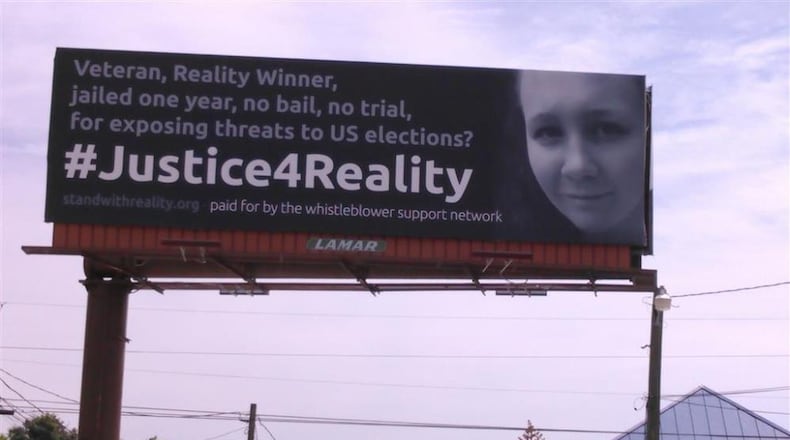Tens of thousands of potential jurors are driving past a billboard in Augusta every day that portrays Reality Winner as an imprisoned hero and the federal government as her oppressor.
The judge who will preside over her case is apparently none too happy. A day after the billboard went up, Chief U.S. District Court Judge J. Randal Hall admonished the only persons in the case whose speech he can control and punish: the attorneys, even if they had nothing to do with the ad.
In a firmly-worded order issued Thursday, Hall warned attorneys in the case to abide by court rules or face being held in contempt of court, which could mean jail or fines, or “other measures.” He didn’t say specifically what prompted the warning, but veteran Atlanta criminal defense attorney Page Pate said it’s likely a “shot across the bow,” a signal that rules against talking to the news media which typically aren’t enforced will be during this high-profile case.
“The court’s concern, and this would be true in any case, is that publicity like that may affect the ability to find an impartial jury,” Pate said.
The billboard went up Wednesday on Washington Road, in the busy Columbia County suburbs about four and a half miles west of the Augusta National Golf Club. Beside Winner’s visage is the message, “Veteran, Reality Winner, jailed one year, no bail, no trial, for exposing threats to U.S. elections?”
Titus Nichols, one of Winner’s lawyers, said her defense team is not affiliated with the supporters who paid for the billboard, a group called Whistleblower Support Network.
“We haven’t had any conversations with them,” Nichols said. “We did not know about the billboard until it was already put up in public.”
The California-based artist who designed the ad also said neither Winner’s defense attorneys nor a group they’ve been loosely affiliated with, Friends of Reality Winner, were involved. The billboard nevertheless lists the group’s website, StandWithReality.org.
In-Depth: Suspect in leak of Russian cyberattack report faces tough legal battle
Winner, the 26-year-old former National Security Agency contractor accused of leaking a top-secret government report about Russian meddling in the 2016 presidential election, is scheduled to face trial on Oct. 15. Her case has attracted international attention, as she is the first person to be prosecuted by the Trump administration on allegations of leaking.
The former Air Force linguist has garnered impassioned support from the left and rebuke from the right.
Winner has pleaded not guilty. She is being prosecuted under the Espionage Act and faces 10 years in prison and $250,000 in fines.
Using private donations, the Whistleblower Support Network paid more than $1,000 for the billboard to remain up for a month on Washington Road, said the ad’s designer and one of the network’s members, Naomi Pitcairn.
Pitcairn said she is delighted by the attention it is getting “because I wanted that judge to see it on his way to work. I want him to know we are paying attention.”
More: Former cellmate provides window into Reality Winner’s life behind bars
But that could turn out to be a terrible idea, said Mark Zaid, a Washington, D.C.-based attorney for whistleblowers and executive director of the James Madison Project. He cited the case of John Kiriakou, the former CIA agent sentenced to 30 months in prison for disclosing the name of an undercover agent to a freelance writer.
An outpouring of support for Kiriakou clearly incensed the judge, Zaid said.
“It is a dangerous situation that can backfire. It can have a negative impact on the case with respect to how the judge handles it, especially with sentencing,” Zaid said. “The people who support individuals like Reality Winner are gung-ho dedicated, and oftentimes with blinders on.”
Zaid called Hall’s order “an aggressive step.” In it, the judge quotes court rules barring attorneys from making public statements about their legal cases that they know could “interfere with a fair trial or otherwise prejudice the due administration of justice.”
Keep Reading
The Latest
Featured





